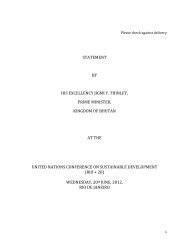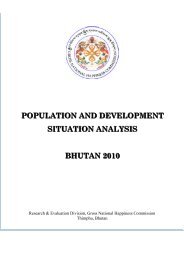COUNTRY BACKGROUND - Gross National Happiness Commission
COUNTRY BACKGROUND - Gross National Happiness Commission
COUNTRY BACKGROUND - Gross National Happiness Commission
Create successful ePaper yourself
Turn your PDF publications into a flip-book with our unique Google optimized e-Paper software.
unacceptably high inequalities of income distribution.<br />
Privatisation<br />
6.5 The Ministries chiefly involved in managing the privatisation programme are the Ministry of Finance and the<br />
Ministry of Trade and Industry, which oversees many of the commercial enterprises which are priorities for<br />
privatisation. However, as Table 6.I indicates, a number of other Ministries and departments also have<br />
responsibilities for public enterprises within their sectors.<br />
Developments during FYP6Developments during FYP6<br />
6.6 In order to promote a suitable institutional and legal environment for privatisation, Government passed "The<br />
Companies Act of Kingdom of Bhutan, 1989". Many enterprises, including public enterprises have been already<br />
incorporated under the Companies Act. For instance, Druk-Air Corporation and Bhutan Polythene and Pipe<br />
Company have been registered under the Companies Act so that the management decisions such as recruitment and<br />
salary fixation need not follow the Royal Civil Service Rules, thus giving the management freedom to act in the<br />
interest of enterprise's efficiency. All companies which have more than one owner have to be registered under the<br />
Companies Act.<br />
6.7 The privatisation of Gedu Wood Manufacturing Corporation was the most significant activity during the 6FYP.<br />
Privatisation of this corporation took place in February 1990 and its management handed over to a private<br />
entrepreneur who owns 41% of the shares in the Corporation. The Government, other private companies and<br />
employees of the Corporation own the remaining shares. The Bhutan Tourism Corporation and Bhutan Polythene<br />
Pipe Company had also been privatised by the end of the 6FYP. In addition, the Government was in the process of<br />
selling most of its shares held in many industries including Bhutan Calcium Carbide Limited, Penden Cement<br />
Authority.<br />
Policy ObjectivesPolicy Objectives<br />
6.8 The objectives of the Royal Government's strategy of privatisation include:<br />
(a) ensuring the efficient management and operation of enterprises, and thereby promoting economic<br />
growth;<br />
(b) limiting the role of Government, so that it can concentrate on activities where there is not an adequate<br />
private sector alternative;<br />
(c) fostering indigenous entrepreneurial and management expertise; and<br />
(d) providing increased opportunities for saving and investing within the Bhutanese economy.<br />
6.9 The Government is fully committed to the privatisation strategy. As indicated in the previous section, a<br />
substantial number of privatisations have already taken place. In future, RGOB will look for private sector<br />
involvement from the start of new ventures and encourage foreign investment though these will be welcomed on<br />
the basis of case by case consideration. Measures to encourage investments and to support indigenous<br />
entrepreneurs are described in Chapter 18 on Manufacturing and Trade.<br />
6.10 During FYP7 the privatisation programme will be continued mostly by divesting shares held by the<br />
government in joint corporations. However, there are limits to the speed with which full privatisation can be<br />
achieved. Factors that have to be taken into account include:<br />
(a) The need for each privatisation to be properly prepared and launched. This involves ensuring that the<br />
concern has an appropriate legal structure, that its assets are properly valued and so forth. In several<br />
cases, there may need to be considerable restructuring of a company before it can be floated.<br />
(b) The capacity of the local capital market to absorb the new shares on offer. The primary purpose of<br />
privatisation is not to raise money for the Government, but there is a danger of realising much less than<br />
the true value of public assets if too many offers are made simultaneously. (This is one of the reasons<br />
why RGOB has, for the time being, retained some of the shares in a number of the companies already<br />
3

















